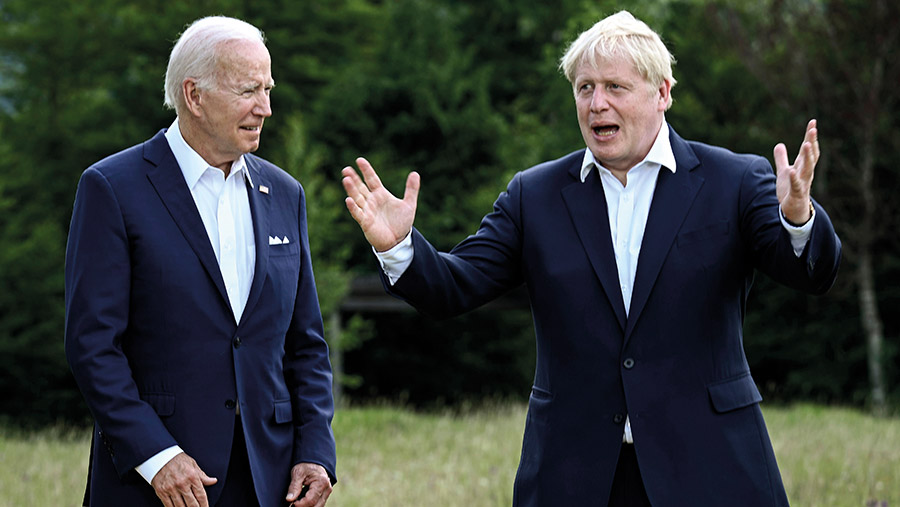Johnson and Biden clash over plans to cut biofuel crops
 © Brendan Smialowski/AP/Shutterstock
© Brendan Smialowski/AP/Shutterstock Boris Johnson and US president Joe Biden are at loggerheads over proposals to reduce the area of crops grown for biofuels and use the spared land to ramp up food production.
The prime minister was due to address EU and world leaders at an emergency summit in Germany on Monday 27 June to discuss the ongoing impact of Russia’s invasion of Ukraine.
He will encourage leaders to look at their use of biofuels and the demands on land for their production. Crops used include wheat, oilseed rape, sugar beet and cane, and maize.
See also: Opinion: The time has come to recruit a minister for food security
Mr Johnson is concerned that globally the use of grain for biofuels is leading to reduced availability of food and higher prices, contributing to the cost-of-living crisis.
A Downing Street source told The Telegraph he wanted to “work together to consider temporarily reducing biofuel production in order to mitigate the spikes caused by the invasion”.
German backing
Germany is believed to support the idea, which could help alleviate grain prices in the short term and relax the market.
But North American officials have said Mr Biden will resist the plans, citing concerns that it could undermine his country’s progress towards net zero and push up fuel prices.
However, Downing Street sources said reducing the production of biofuels would have little impact on fuel prices as bioethanol – the green component of E10 petrol – accounted for just 0.1% of global fuel supply, while the effect on net zero would be “negligible”.
Despite the UK government’s commitment to achieve net zero by 2050, Mr Johnson is expected to persist with the plans, which would require the consent of all G7 leaders, and will tell the meeting Russian president Vladimir Putin’s actions in Ukraine “are creating terrible aftershocks across the world, driving up energy and food prices as millions of people are on the brink of famine”.
He will say: “Only Putin can end this needless and futile war. But global leaders need to come together and apply their combined economic and political heft to help Ukraine and make life easier for households across the world. Nothing should be off the table.”
Grain silos blockaded
Mr Johnson will also urge leaders to take action to help Ukraine shift 25m tonnes of grain from its silos, many of which have been blockaded by the Russian military, before it rots.
With harvest due to get under way soon, space will be needed for new crops.
Russian blockades have stopped grain exports from Ukrainian ports, including Odesa, the main Black Sea port from where large quantities are exported to North Africa and Asia.
Exports of grain from ports typically account for 96% of all Ukrainian grain exports.
The UK is spending £10m to upgrade Ukrainian railways destroyed by Russian bombs and to help get grain out of the country by rail.
It is also contributing £1.5m to develop a “testing process” to identify whether grain sold by Russia on the world market has been illegally taken from Ukraine.
